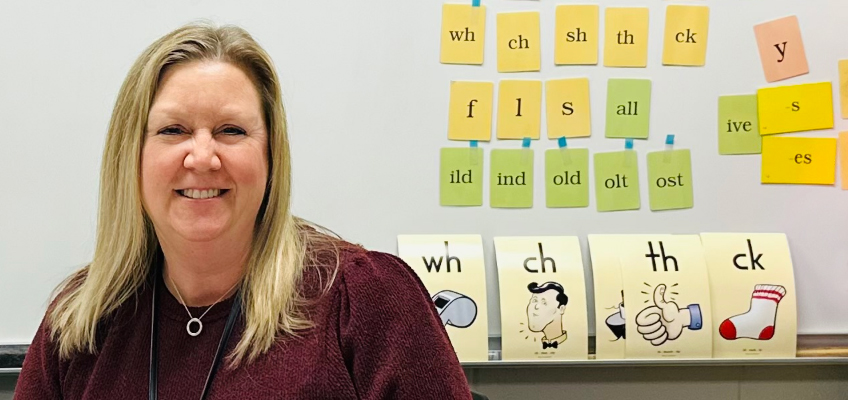
Carrie Jermolowicz, a K–4 reading specialist, knows firsthand the importance of laying the groundwork for lifelong literacy.
The Wilson Reading System® (WRS) Level II Certified Teacher works at Luther J. Schilling School in Homer Glen, IL, which has been implementing WRS and Fundations® since 2020. Fundations serves K-2 students as a Tier 1 foundational skills program in the general education classroom and as a Tier 2 early intervention for at-risk readers. WRS is the school’s Tier 3 intervention for students in grades 2–4 who require more intensive Structured Literacy instruction.
Fundations for Grades K-2
Over the past three years, Schilling teachers have found that implementing Fundations in Tier 1 has lessened the need for Tier 2 and Tier 3 interventions. The long-term strategy of incorporating a foundational skills program into the school’s curriculum has far-reaching and positive effects. That’s a good thing because Carrie’s goals for students go beyond getting them to pass their next assessment.
“I don’t think, ‘I need to get them through this year,’” the reading specialist said. “I need to see them reading as adults.”
When Carrie first started in her role, the school used different initiatives and intervention programs with less success. A special education director who joined the staff for a time brought a fresh focus to literacy instruction and dyslexia. Before that director left the district, she paved the way for teachers to become trained in Fundations and WRS Level I Certified.
“Wilson has been a game changer,” Carrie remarked.
The proof of Fundations’ effectiveness at Schilling is in the benchmark test scores. During the fall of the 2021–2022 school year, benchmark tests showed:
Winter test results showed that 21 of these students no longer needed the support of Tier 2 and 3 interventions between the middle and end of the year.
“We’ve never exited that many kids from interventions before,” Carrie said.
By the end of the school year, tests showed:
The 2022–2023 school year is proving to be just as successful with a new group of first graders. At the beginning of the year, benchmark tests revealed:
Recent winter benchmark tests showed only 25% of first graders were eligible for Tier 3 and 18% of first grade students were eligible for Tier 2. This increase in Tier 2 eligibility reflects the fact that some students moved from Tier 3 intervention to Tier 2. Many Tier 3-eligible students no longer required intensive intervention and joined the Tier 1 group. Carrie anticipates the number of children in need of Tier 3 intervention will continue to decline.
When asked the reason for such a pronounced shift in reading scores, she answered, “I think it was the strong Tier 1 implementation of Fundations. Our first grade teachers did an awesome job of implementing and sticking to the program with fidelity, and that’s why we saw the success that we did.”
WRS for Grades 2-4
Although many students in Schilling School no longer need interventions after Fundations instruction, students who continue to show slow growth or test well below grade level on oral reading fluency are assessed to see if they could benefit from WRS instruction. If they’re identified as WRS candidates, Carrie begins working with them; she has witnessed some great success stories over the years.
One student in 2021–2022 began the year with a reading score in the first percentile; Carrie began WRS instruction with the student. By the end of the year, his reading score rose to the 28th percentile, which is remarkable progress. He even gained the confidence to share his stories with a guest mentor author whom Carrie invited for an online class visit. This student is one of many who have exited interventions this year.
“That’s what I love,” she said. “I get to personally see their confidence shoot up as they’re working with WRS in my classroom. Even the kids who really struggle and ‘hate’ reading. By the end, I’ve won them over. They may not go home and pick up a book, but we’re getting there.”
In Homer Glen, parents have been excited about the results Wilson programs bring to their students’ education.
“It’s a big thing,” Carrie said. “Parents know what’s going on in the classroom. They don’t always realize how they themselves did or didn’t learn to read, so they learn from me explaining it to them. But with the resources provided, the online component, I can send things home and they can get the gist of what’s going on. They’re learning with their kids!”
With family support, Fundations instruction in Tiers 1 and 2, and WRS Tier 3 intervention when needed, the students at Schilling School are on their way to becoming lifelong independent readers.